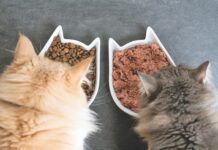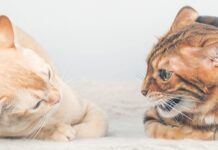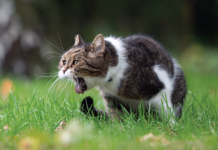I am the owner of Tassu, a 10-month-old cat I adopted from an animal shelter. A few weeks after I had her neutered, I noticed her behavior had changed. She seemed very lazy and not really interested in any physical activities, and she also lost her appetite. I took her to my veterinarian, and he found that she had pale gums, so he recommended she be tested for infection with feline leukemia virus (FeLV). To my deep sorrow, the test was positive, and my veterinarian believes her illness is a result of her infection.
Unfortunately I have another cat, Nipsu, about 18 months old, sharing my home with me, and she and Tassu were together for about five days before I knew about Tassus infection. Nipsu is not vaccinated against FeLV, and although I separated the two cats right away, Im worried that she may have become infected. My veterinarian suggested testing her in about a month to allow time for the test to become positive if she is infected. Needless to say, Ill have her vaccinated immediately if she tests negative.
Of course I wish to have both cats at home with me, but I dont want to put Nipsus health at risk. If I understand correctly, FeLV vaccines dont protect every cat from infection; can I have a properly vaccinated cat together with an FeLV-positive cat? If it is possible, what other precautions should I take into consideration?
I know its too late to help Nipsu in this regard, but I want to remind our other readers that I always recommend keeping a newly adopted cat separate from any resident cats (like in a spare bedroom or bathroom with a litter box, food and water, and a scratching post) until examined by a veterinarian. Among other reasons, this allows testing for FeLV, feline immunodeficiency virus (FIV), internal parasites (like roundworms) and external parasites (like fleas) – all of which are contagious to other cats – before the new roommates have nose-to-nose or claw-to-face encounters. It just makes sense from an infectious disease standpoint.
And I agree with your veterinarians suggestion to keep the cats separated from each other until we know whether Nipsu has become infected. Because it can take a month or longer from the time a cat is exposed to FeLV until the results of the commonly used tests become positive, testing at least four weeks after separating the two makes sense. If Nipsu, too, is infected, then there is no reason to keep the kitties apart.
Might the Bullet Have been Dodged?
Having said this, the odds are that Nipsu did not get infected. Why? First, cats over a year of age, whether FeLV vaccinated or not, are naturally quite resistant to infection (in contrast to kittens, which are, sadly, very susceptible). FeLV vaccination of an adult cat simply provides an extra level of assurance for cats that may be exposed to the virus.
Second, even though the two cats were sharing the same house, it is possible that Nipsu was not exposed to a sufficient number of viruses to infect her. The saliva of an FeLV-infected cat is loaded with virus, but it retains its ability to cause infection for a few hours at most once it is outside the kitty. So unless Tassu bit Nipsu (possible) or they became fast friends (unlikely in just five days) and licked each other or ate from the same dish at about the same time, its possible that Nipsu was never exposed to enough viable virus to endanger her. Let me know the results of the test when you receive them. I hope that my guess is correct!
Separate is Best
If Nipsu has escaped infection for now, the best way to protect her is to find a different home for Tassu. However, I know this may not be possible; there are exceptions, but most people wont knowingly adopt FeLV-infected cats. My advice then would be to keep the cats in separate areas of the house. They should be completely separated – dont allow them to share any space. This will necessitate your providing them each with their own litter boxes, food and water dishes, toys, scratching posts and the like. And just to be on the safe side, make sure your veterinarian vaccinates Nipsu for FeLV.



